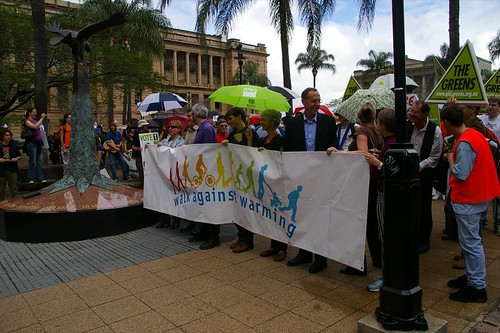Friday Feb 2nd 2007
From The Star (Malaysia).
PARIS (AP): The bleak outlook of a major new report on climate change shifted the onus onto governments, even mankind, to stop prevaricating and truly act, with warnings Friday from around the world that drastic, rapid change is needed _ not least from the United States.
"We are on the historic threshhold of the irreversible,'' warned French President Jacques Chirac. He called for an economic and political "revolution'' to save the planet.
Campaigners and governments pressed industrial nations, some specifically naming the United States, to significantly cut greenhouse-gas emissions. Others said the threat was not simply to the environment, but to international peace, prosperity and development. There were immediate calls for urgent talks to hammer out a new worldwide agreement to stop global warming.
South Africa's Environmental Affairs Minister Marthinus van Schalkwyk said failure to act would be "indefensible.'' His Indonesian counterpart said "drastic steps'' were needed to slow rising temperatures.
"We are now beyond a critical turning point in the debate: those who continue to ignore the threat and its causes, or invoke half-baked arguments to confuse and obstruct, will be doing the greatest disservice imaginable to current and future generations,'' van Schalkwyk said.
The long-awaited report from the Intergovernmental Panel on Climate Change said global warming is "unequivocal,'' "very likely'' man-made and will "continue for centuries'' _ findings bleaker than its last report in 2001.
"If the last IPCC report was a wake up call, this one is a screaming siren,'' said Stephanie Tunmore, of Greenpeace.
"The good news is our understanding of the climate system and our impact on it has improved immensely. The bad news is that the more we know, the more precarious the future looks,'' Tunmore said. "There's a clear message to governments here, and the window for action is narrowing fast.''
The Indonesian minister, Rachmat Witoelar, has predicted that some 2,000 of Indonesia's estimated 18,000 islands would be swallowed by the sea within three decades because of man-made climate change.
"Developing countries must make binding commitments to cut emissions by 40 to 60 percent. And we in Indonesia must guard against the burning of our forests and better monitor our industries,'' he said in the capital, Jakarta, where days of torrential rain caused rivers to break their banks Friday, submerging streets in muddy water and inundating homes and businesses.
"We want to see our grandchildren enjoy the earth too, don't we?''
Campaigners said emissions of heat-trapping greenhouse gases must be reined in. Friends of the Earth said industrialized nations "must lead the way'' and help less-developed countries develop sustainable, low-carbon economies. The European Union's environment commissioner, Stavros Dimas, said that by 2020, developing nations should cut their emissions to two-thirds of the level they were in 1990.
"Alarm bells are ringing. The world must wake up to the threat,'' said Catherine Pearce, of Friends of the Earth. "There is still time to act, but urgent action is required.''
The South African minister said the report "is a wake-up call to the world's largest emitter, the United States.''
"There are no more doubts on humanity's responsibilities and the conclusion is clear: man is the cause, and man is the solution,'' said Roberto Della Seta, president of Legambiente, Italy's main environmental group. "Only urgent, immediate government action on a vast scale can avert catastrophic consequences.''
Scientists hailed the report as a landmark. It makes clear that sea levels will rise inexorably over coming centuries. "It is a question of when and how much, and not if,'' World Meteorological Organization Secretary General Michel Jarraud said.
Failure to act in light of the "unequivocal'' new scientific evidence on global warming "will one day in the history books be considered irresponsible,'' U.N. Environment Program executive director Achim Steiner said.
"This new report should spur policymakers to get off the fence and put strong and effective policies in place to tackle greenhouse gas emissions,'' he said. "The implications of global warming over the coming decades for our industrial economy, water supplies, agriculture, biological diversity and even geopolitics are massive.''
Read the article.
Also see:
- Politics UK,
- CNW Group Canada,
- Toronto Daily News,
- Common Dreams,
- Hindustan Times (scroll down to header "Call to save Ganga"),
- Mirror (UK)





No comments:
Post a Comment